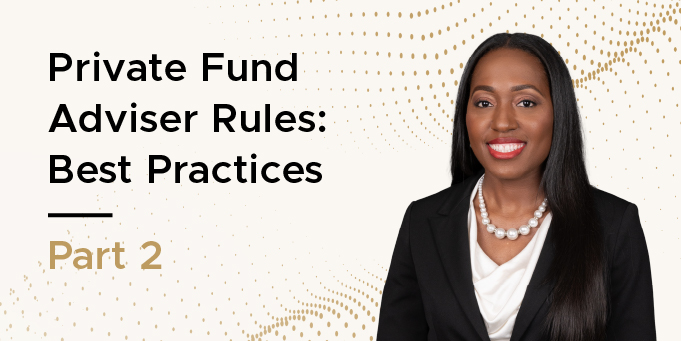Private Fund Adviser Rules: Best Practices Part 1 - Fairness or Valuation Opinions in Adviser-Led Secondaries
- Published
- Jul 10, 2024
- By
- TaNeka Ray
- Share
Many compliance professionals are wondering what is next after the United States Court of Appeals for the Fifth Circuit Court’s decision to vacate the Securities and Exchange Commission’s (SEC) recently adopted Private Fund Adviser Rules. At this time, it is unclear whether the SEC will appeal the Fifth Circuit decision.
In this three-part video series on the “Private Fund Adviser Rules: Best Practices,” TaNeka Ray, Senior Manager for EisnerAmper’s Regulatory Risk & Compliance Solutions, explains that the SEC’s examinations and enforcement actions will continue to focus on the topics addressed in the PFARs. This first part will cover best practices for fairness or valuation opinions in adviser-led secondaries.
Transcript
TaNeka Ray:
Hello. Welcome to EisnerAmper's SEC Regulatory and Compliance Series. My name is TaNeka Ray, and I work in the regulatory compliance group at EisnerAmper. Today, I'll cover Best Practices to Take From the Private Fund Advisor Rules. As you all know, in August 2023, the SEC adopted the private fund advisor rules, which was recently vacated by the United States Courts of Appeals for the Fifth Circuit. Had the rule gone into effect, it would have changed the way the SEC regulates private fund advisors and the way private fund advisors operate. While the private fund advisor rules may not be going into effect anytime soon, the SEC's examinations and enforcement actions will continue to focus on the topics that are addressed in the private fund advisor rules.
Let's get started. Best practices for fairness or valuation opinions in advisor-led secondaries. The advisor-led secondaries rules states that when an advisor offers investors, the choice between selling and exchanging their interests in a private fund for interest in another vehicle advised by the same advisor or any of its related persons as part of an advisor-led secondary transaction, an advisor has a conflict of interest with the fund and its investors. The SEC defines an advisor-led secondary transaction as any transaction initiated by the advisor or any of its related persons that offer private fund investors the choice to one, sell one or a portion of their interest in the private fund, and two, convert or exchange all or a portion of their interest in the private fund for interest in another vehicle advised by the same advisor or any of its related persons.
Due to the inherent conflict of interest in advisor-led secondaries, SEC-registered investment advisors that engage in advisor-led secondary transactions are required to obtain and distribute a fairness or valuation opinion and provide a summary of any material business relationships between the advisor or its related persons and the independent opinion provider within two years prior to the issuance of the opinion. Simply put, a fairness opinion or valuation opinion is a valuation analysis of assets that can be prepared by an independent firm that specializes in valuations. Fairness or valuation opinions are considered a best practice in transactions with the appearance of conflicts of interest, such as advisor-led secondary transactions, because it provides investors with financial information related to a transaction that is needed to help make an informed investment decision. It is prepared by an independent third-party, which reduces the possibility of fraudulent, deceptive, or manipulative activities and it prevents the advisor from overvaluing the assets being valued.
To support compliance with the record-keeping requirement, advisors should make and retain a copy of the fairness opinion or the valuation opinion and material business relationship summary that is distributed to investors, specifically noting the name of each investor, the investor's address, and date of issuance. That concludes part one of the Best Practices to Take From the Private Fund Advisor Rules. Thank you for watching and join me in the next episode in the SEC Regulatory Compliance Series. Again, my name is TaNeka Ray with EisnerAmper. I welcome you to connect with me on LinkedIn.
Transcribed by Rev.com

Private Fund Adviser Rules: Best Practices | Part 2 - Fund Audits
What's on Your Mind?
Start a conversation with TaNeka
